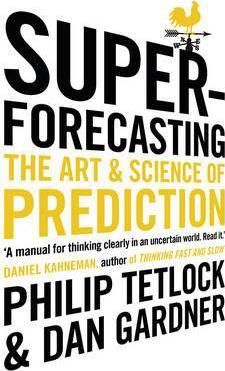Dan Gardner
autor
Risk
We are the safest humans who ever lived - the statistics prove it. And yet the media tells a different story with its warnings and scare stories. How is it possible that anxiety has become the stuff of daily life?In this ground-breaking, compulsively readable book, Dan Gardner shows how our flawed strategies for perceiving risk influence our lives, often with unforseen and sometimes-tragic consequences. He throws light on our paranoia about everything from paedophiles to terrorism and reveals that the most significant threats are actually the mundane risks to which we pay little attention.Speaking to psychologists and scientists, as well as looking at the influence of the media, Gardner uncovers one of the central puzzles of our time: why are the safest people in history living in a culture of fear?
Vypredané
4,75 €
5,00 €
Superforecasting
What if we could improve our ability to predict the future? Everything we do involves forecasts about how the future will unfold. Whether buying a new house or changing job, designing a new product or getting married, our decisions are governed by implicit predictions of how things are likely to turn out. The problem is, we're not very good at it. In a landmark, twenty-year study, Wharton professor Philip Tetlock showed that the average expert was only slightly better at predicting the future than a layperson using random guesswork. Tetlock's latest project - an unprecedented, government-funded forecasting tournament involving over a million individual predictions - has since shown that there are, however, some people with real, demonstrable foresight. These are ordinary people, from former ballroom dancers to retired computer programmers, who have an extraordinary ability to predict the future with a degree of accuracy 60 per cent greater than average. They are superforecasters. In Superforecasting, Tetlock and his co-author Dan Gardner offer a fascinating insight into what we can learn from this elite group. They show the methods used by these superforecasters which enable them to outperform even professional intelligence analysts with access to classified data. And they offer practical advice on how we can all use these methods for our own benefit - whether in business, in international affairs, or in everyday life.
Vypredané
14,73 €
15,50 €
Superforecasting
What if we could improve our ability to predict the future?
Everything we do involves forecasts about how the future will unfold. Whether buying a new house or changing job, designing a new product or getting married, our decisions are governed by implicit predictions of how things are likely to turn out. The problem is, we're not very good at it.
In a landmark, twenty-year study, Wharton professor Philip Tetlock showed that the average expert was only slightly better at predicting the future than a layperson using random guesswork. Tetlock's latest project – an unprecedented, government-funded forecasting tournament involving over a million individual predictions – has since shown that there are, however, some people with real, demonstrable foresight. These are ordinary people, from former ballroom dancers to retired computer programmers, who have an extraordinary ability to predict the future with a degree of accuracy 60% greater than average. They are superforecasters.
In Superforecasting, Tetlock and his co-author Dan Gardner offer a fascinating insight into what we can learn from this elite group. They show the methods used by these superforecasters which enable them to outperform even professional intelligence analysts with access to classified data. And they offer practical advice on how we can all use these methods for our own benefit – whether in business, in international affairs, or in everyday life.
How Big Things Get Done
World expert Bent Flyvbjerg and bestselling author Dan Gardner reveal the secrets to successfully planning and delivering ambitious projects on any scale.
Nothing is more inspiring than a big vision that becomes a triumphant, new reality. Think of how Apple’s iPod went from a project with a single employee to an enormously successful product launch in eleven months. But they are the exception. Consider how London’s Crossrail project delivered five years late and billions overbudget. More modest endeavours, whether launching a small business, organizing a conference, or just finishing a work project on time, also commonly fail. Why?
Understanding what distinguishes the triumphs from the failures has been the life’s work of Oxford professor Bent Flyvbjerg. In How Big Things Get Done, he identifies the errors that lead projects to fail, and the research-based principles that will make yours succeed:
- Understand your odds. If you don't know them, you won't win.
- Plan slow, act fast. Getting to the action quick feels right. But it's wrong.
- Think right to left. Start with your goal, then identify the steps to get there.
- Find your Lego. Big is best built from small.
- Master the unknown unknowns. Most think they can't, so they fail. Flyvbjerg shows how you can.
Full of vivid examples ranging from the building of the Sydney Opera House to the making of the latest Pixar blockbusters, How Big Things Get Done reveals how to get any ambitious project done — on time and on budget.
Vypredané
20,85 €
21,95 €






